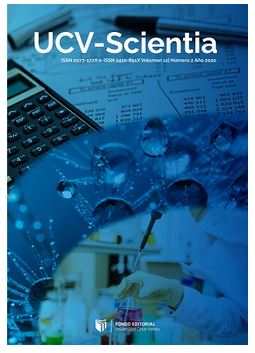Principles that university lecturers consider when developing mathematical problems
DOI:
https://doi.org/10.18050/RevUcv-Scientia.v10n2a2Keywords:
Teaching principle, Creativity, Meaningful learning, Mathematical problemAbstract
This research aims to describe the principles that university lecturers consider when developing mathematical problems. The study variables are the lecturer's principles, and the evaluated dimensions; principle of creativity of the mathematical problem, principle of strategies used in the development of the problem, principle of contextualization of the problem, principle of significance of the problem for the student and principle of development of abilities of quantitative reasoning. Meaningful learning sustains that the lecturer, when formulating a problem, and the student, when solving it, should cause interest and practical utility. This is an investigation of quantitative approach, descriptive level, non-experimentaltransversal design. The technique used was the survey and the questionnaire as the instrument. Besides, 60 teachers of basic mathematics participated. Among the results it was discovered that 73 % of lecturers develop real problems related to daily life. In addition, 60 % consider the motivations and interests of the students. Conclusions: Lecturers have a tendency to create a new problem with another known problem as a reference or few create problems using a given problematic situation as a guide, but in general, teachers do not have the habit of creating new problems. The majority of teachers spend little time developing a problem. They spend less than 30 minutes, and only change some data to the problems that already exist in books or on the Internet. Elaborating totally new, original, current contextual problems that do not exist in any book, would require more time.
Downloads
Published
How to Cite
Issue
Section
License

This work is licensed under a Creative Commons Attribution-NonCommercial 4.0 International License.
- Share — copy and redistribute the material in any medium or format
- Adapt — remix, transform, and build upon the material.
- The licensor cannot revoke these freedoms as long as you follow the license terms.
Under the following terms:
-
Attribution — You must give appropriate credit, provide a link to the license, and indicate if changes were made. You may do so in any reasonable manner, but not in any way that suggests the licensor endorses you or your use.
- No additional restrictions — You may not apply legal terms or technological measures that legally restrict others from doing anything the license permits.













